Institutional Context
Summary
Since its foundation as England’s first civic university in 1900, the University of Birmingham has accelerated the potential of a forward-thinking, industrious, global city through its research and teaching.
This spirit of innovation guides our work with industry and regional partners to support the delivery of major University-led projects such as the Birmingham Health Innovation Campus and Tyseley Energy Park. We have founded Britain’s only University Secondary Training School, and in 2021 we opened our Birmingham city-centre presence and hub for public engagement, The Exchange, and our state of the art campus in Dubai.
We are proud to be a pioneering global institution with roots firmly in our local city region.
Institutional context
Engagement and Impact is one of the six pillars of the University of Birmingham’s 2030 Strategic Framework, and our sector-leading knowledge exchange initiatives extend from Birmingham around the globe.
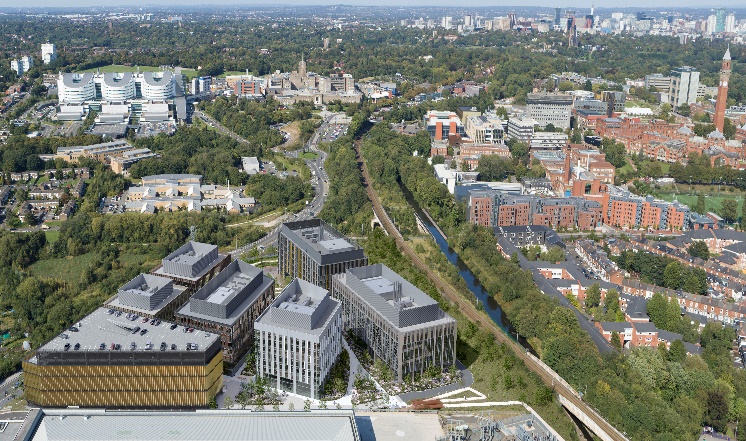
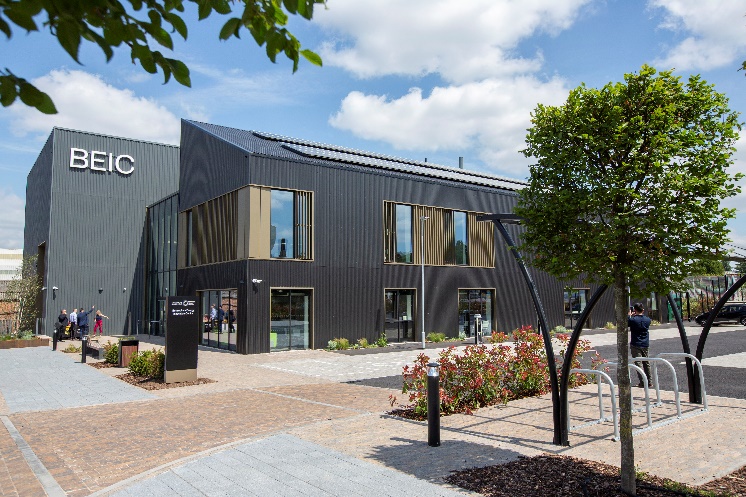 We
are committed to collaborating with private,
public
and third-sector partners, responding together to regional
and national challenges in areas such as education,
energy,
social
inequality, and the coronavirus
outbreak. We collaborate with major multinational companies at
scale, with two UK-RPIF
funded centres - in high-temperature
materials, and in rail-systems
engineering - and provide advice and incubator space for SMEs at
our Research
Park. We have led the establishment of the Birmingham
Health Innovation Campus, which will support the development and
application of new healthcare treatments; Tyseley
Energy Park, which pioneers new sustainable energy solutions in
transport, electricity and heating; and WM-REDI,
which leads on evidence-based inclusive growth strategies across the UK,
partnering with the West Midlands Combined Authority. The recently
established Birmingham Institute for Sustainability and Climate Action
(BISCA)
will bring together partners to translate research into real world
solutions for a sustainable future.
We
are committed to collaborating with private,
public
and third-sector partners, responding together to regional
and national challenges in areas such as education,
energy,
social
inequality, and the coronavirus
outbreak. We collaborate with major multinational companies at
scale, with two UK-RPIF
funded centres - in high-temperature
materials, and in rail-systems
engineering - and provide advice and incubator space for SMEs at
our Research
Park. We have led the establishment of the Birmingham
Health Innovation Campus, which will support the development and
application of new healthcare treatments; Tyseley
Energy Park, which pioneers new sustainable energy solutions in
transport, electricity and heating; and WM-REDI,
which leads on evidence-based inclusive growth strategies across the UK,
partnering with the West Midlands Combined Authority. The recently
established Birmingham Institute for Sustainability and Climate Action
(BISCA)
will bring together partners to translate research into real world
solutions for a sustainable future.
We support academics to engage with policy makers; our Founders’ Awards celebrate outstanding knowledge exchange research, and through the work of University of Birmingham Enterprise, we manage our extensive technology-transfer and academic-consultancy business, IP protection and spinout portfolio.
Our 250-acre campus welcomes hundreds of thousands of visitors annually for lectures, community events and educational trips to our renowned cultural collections, Lapworth Museum, Barber Art Gallery, Winterbourne Botanical Gardens and Concert Hall. Our campus provided the principal village for athletes at the 2022 Commonwealth Games and was the focal point of a festival of research and teaching-led activities. As well as engaging the public with our research on campus, we regularly share and create with communities, Our city-centre presence, The Exchange, provides a space for shaping the ideas that will make our cities and regions better places to live, work and learn.
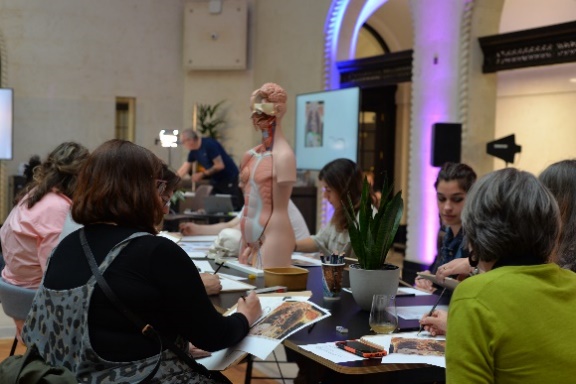
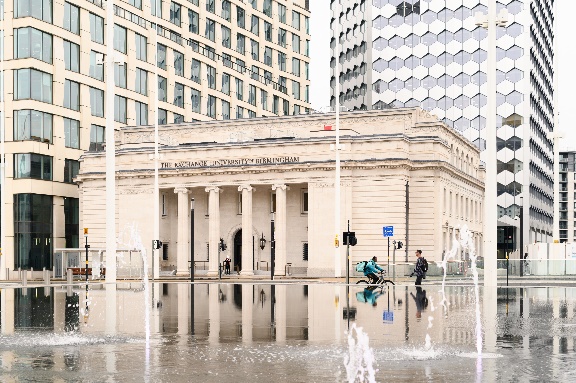
Our work continues to inspire and provide new pathways into education. We lead the West Midlands Aim Higher Partnership, are the only university to have our own secondary training school, and are using our rail expertise and industry partnerships to revitalise the National College of Advanced Transport & Infrastructure. We facilitate student engagement with the region through placement modules, internships and volunteering.
As a globally renowned institution we take locally developed insights and apply them to global challenges, while simultaneously bringing the latest international innovations to our city and region. We do this through the work of the Institute of Global Innovation, as a founding member of Universitas 21 and in close partnership with universities in Europe, North America, China, Brazil and India. Our new Dubai campus provides an exciting and unprecedented base for translating our research capabilities and expertise into diverse international contexts.
Throughout our history, we have been proud to be an institution that continually redefines the role of the global, civic university.
For further information, please send queries to knowledgeexchange@contacts.bham.ac.uk
Local Growth and Regeneration
Summary of approach
The University of Birmingham is working more closely than ever with local stakeholders to ensure that our contribution to local growth and regeneration is user-led. As a result, our region's growing range of local development initiatives are the product of local public-private consortia.
Our contribution extends across a broad spectrum, including community welfare support to arts and culture partnerships, partnership with Commonwealth Games 2022 (CWG22), access to skills, and investment in regional R&D assets driving world-class research, innovation and growth. Our priority investments in Health and Energy are examples of large-scale, high-impact collaborations benefiting regional businesses and promoting innovation, improved productivity and jobs. They also contribute to sustainability and the regeneration of more deprived communities.
Aspect 1: Strategy
As a major anchor institution in the Birmingham city region, our role was at the core of Joseph Chamberlain's founding vision. Our current Strategic Framework states, 'More than a century on, we remain committed to ensuring the University has national and global influence and is at the heart of our region's renaissance'. The priorities below reflect a convergence of our civic mission and the needs of the city region, with outcomes expected across all six pillars of our Framework.
Spatial geographies
Regionally, four distinctive spatial geographies – as defined by local stakeholders and beneficiaries - are the focus of our contribution (see table 1). Our strategy is determined through collaborative partnerships with stakeholders that align our capacity and capability with their needs.
Examples of our contributions to local growth and regeneration include flagship projects with large-scale capital investments dedicated to collaboration with partners, such as the Birmingham Health Innovation Campus, Tyseley Energy Park, and the Manufacturing Technology Centre.
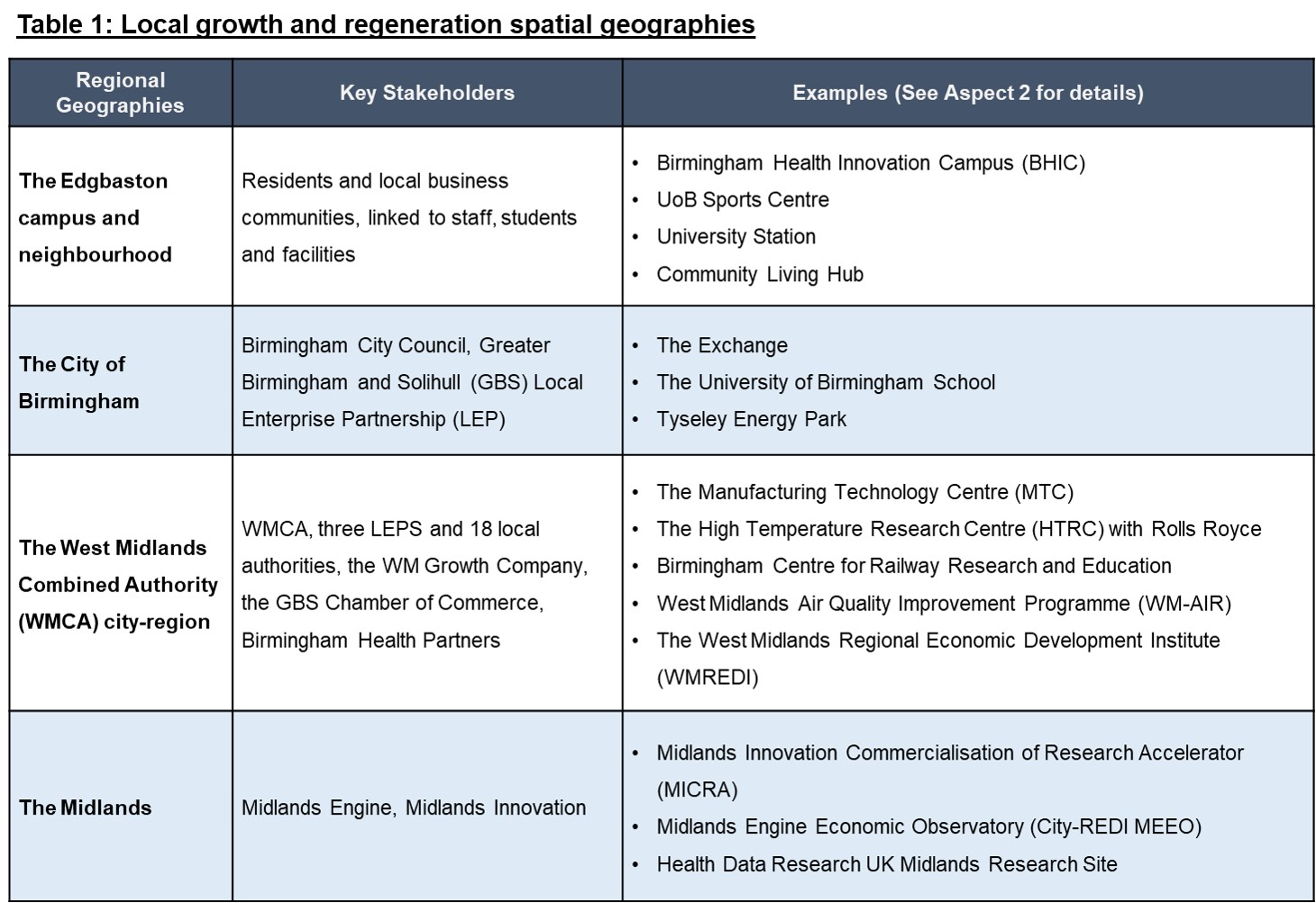
The Exchange, in the heart of Birmingham, has developed as a focus for engaged research with users:
Hosting a student and recent graduate business incubator,
Home of the Birmingham Leadership Institute (BLI), supporting local public sector leaders,
WMREDI provides a forum for policymakers to work with data analysts and researchers on balanced, inclusive economic growth challenges (see also City-REDI below).
In addition, The Exchange hosted UK House during the Commonwealth Games, and the University worked with the WM Growth Company, DIT and other partners to promote inward investment to the region and nationally.
Engagement with partners drives our strategic prioritisation
Engagement with partners sits at the heart of our governance structure and strategy-development processes at all levels of the University. Our Council has a range of regional representatives, including the CEO of BCC. In addition, our Regional Engagement Group reports to the University Executive Board on regional matters, while the Stakeholder Engagement Group provides a single point of contact for external stakeholders. The University's DPVC for Regional Engagement, Professor Simon Collinson, coordinates this work and is also the Director of City-REDI and WMREDI.
Key members of faculty and staff represent the University on a range of committees and advisory boards related to growth and regeneration, including the Midlands Engine Partnership Board, Midlands Innovation, the WM Growth Company, the WMCA Economic Impact Group, WM Innovation Board, the CBI regional council and the CBI R&D group.
The Birmingham 2022 Commonwealth Games (CWG22) success and the University's leading role in this have been widely recognised locally and nationally. We were a Partner with CWG22, our campus hosting the majority of athletes alongside the Hockey and Squash events. In addition, CWG22 provided a platform for new partnerships and additional inward investment in the region, as well as nationally and internationally: the WM Growth Company reports a significant increase in regional investment opportunities, many resulting from meetings and events held in DIT's UK House in The Exchange.
We also contribute significantly to the regeneration of global city regions, not least through our campus in Dubai, which is both an education centre and an investment in engaged research with a strong regional focus. The University has established a permanent presence in three of the world's most rapidly emerging countries with our India and China Institutes and Brazil forum. These collaborations, focusing on areas such as advanced manufacturing and smart cities, ensure UoB honours its legacy as a global hub of industrial and social innovation whilst bringing cutting-edge insights from around the world into our region.
Aspect 2: Activity
The people of Birmingham and the broader West Midlands region have lower health outcomes, higher levels of unemployment, and lower skills, relative to the UK average. Inclusive growth plans, and the more specific local industrial strategy led by the WMCA, aim to both improve the rate of economic growth and reduce economic and social inequalities. A number of our flagship initiatives meet both sets of objectives and align research-led innovations with the specific needs of private and public sector partners.
Healthcare
Birmingham Health Partners has provided the platform for an integrated approach to research, innovation and improved healthcare delivery across the region by the University and its NHS partners. Its joint strategy, governance, and delivery mechanisms, allow us to target research at key areas of the local populational need while drawing in cross-sector working across industry, charities, policy and patients.
In the past five years, we have transformed our joint academic-NHS infrastructure, creating the UK's largest experimental medicine unit and an integrated Institute of Translational Medicine, bringing together scientists, engineers, clinicians and industry.
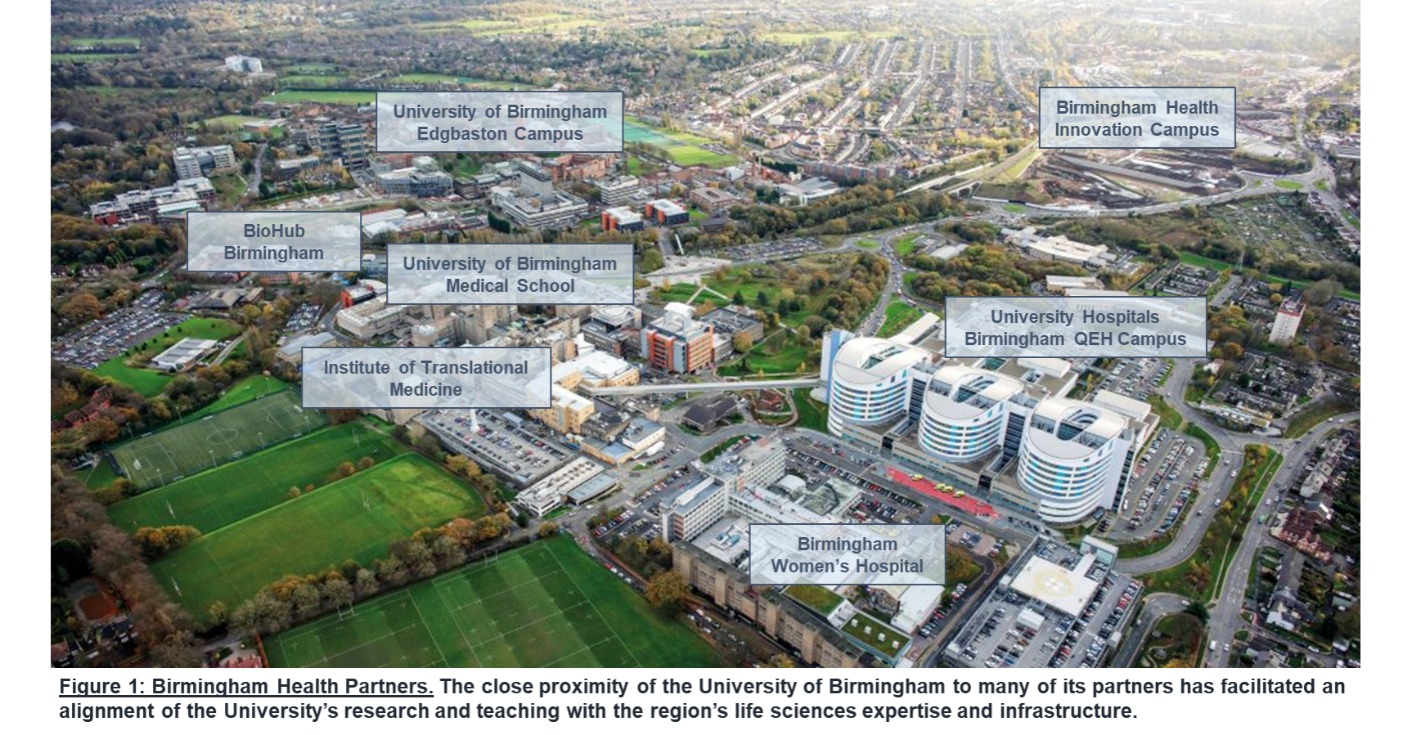
Our region has the UK's second-largest cluster of medical technology companies. We have focused on specific support for this sector, including the Medical Devices Testing & Evaluation Centre and Data-Enabled Medical Technologies and Devices Hub. These programmes have supported over 150 regional companies to move products closer to market. Our BioHub provides desperately needed incubation laboratory capacity for the region, while our new innovation facility on the Birmingham Health Innovation Campus (BHIC), the Precision Health Technologies Accelerator, will upscale capacity and capability to support regional, national and global companies within the next three years.
Energy
Supporting the route to net zero carbon, the Birmingham Energy Institute (BEI) has led the establishment of platforms for research and innovation across the city region. BEI directs the Energy Research Accelerator (ERA), a £60m investment by Government and £120m investment by over 40 industrial partners and 8 Midlands universities.
BEI led a policy commission to establish the regional approach to clean energy innovation, resulting in the formation of five regional energy innovation zones. Our £20m co-investment with the GBSLEP is establishing the Birmingham Energy Innovation Centre at Tyseley Energy Park; the facility is also home to the Climate Innovation Platform project, which offers business acceleration and incubation support in partnership with Energy Systems Catapult and HSBC. This is complemented by the Accelerating Thermal Energy Technology Adoption (ATETA) project, which provides much-needed technical support, and has supported over 360 SMEs in the region to accelerate new energy innovations to market.
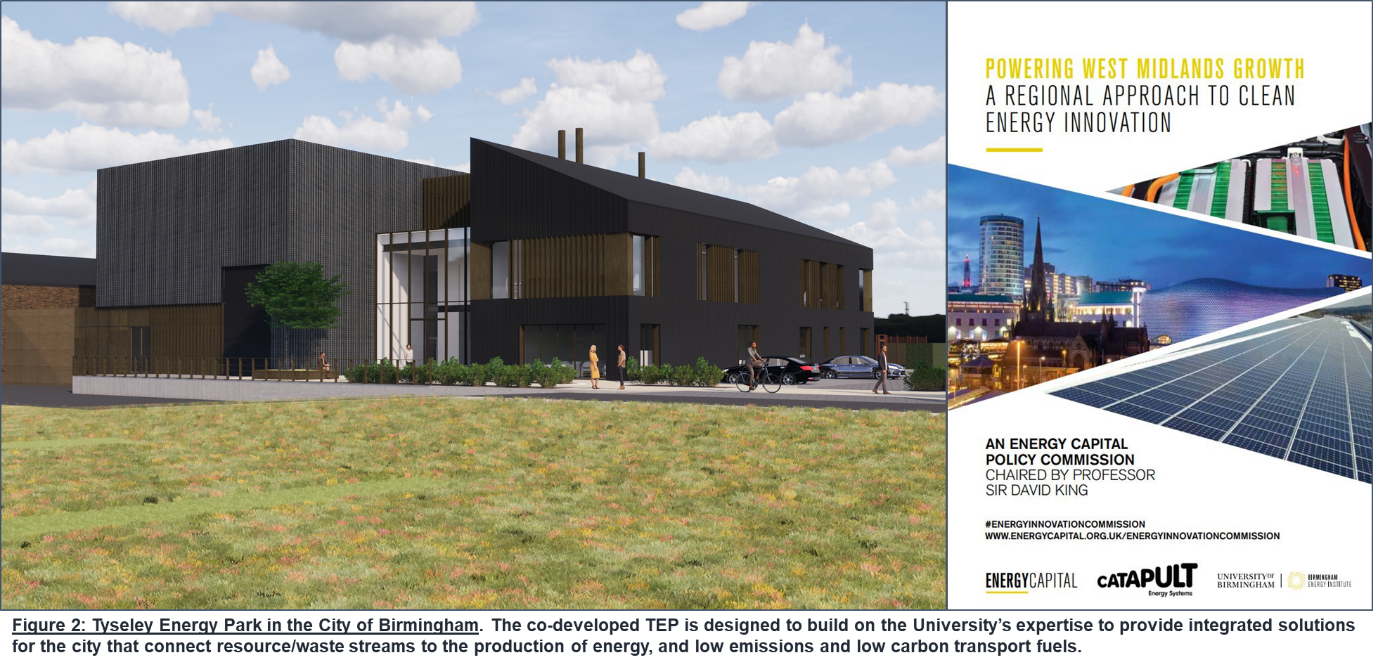
Economic Growth
The City-Region Economic Development Institute and the RED-funded WMREDI continue to work with the WMCA, WM Growth Company, the GBS Chamber of Commerce, two local HEIs, Birmingham City Council and the Midlands Engine to support a regional network of data-gathering, analysis and policy development for inclusive growth. In addition, city-REDI produces the Economic Impact Monitor presented to the Economic Impact Group, chaired by the WM Mayor, Andy Street. This provides a range of consortia opportunities and helps align our contribution to the region's needs.
The University leads a multi-partner bid with the WMCA as part of the £30m Innovation Accelerator, one of three regions receiving BEIS-UKRI funding to boost regional innovation.
Advanced Manufacturing
The Manufacturing Technology Centre (MTC) was established in 2010 to bridge the academia-industry gap. Its role covers R&D, training, Advanced Manufacturing Management, and Factory Design. UoB is a founding partner, initially driven by a longstanding relationship with Rolls-Royce.
MTC offers the opportunity for commercial applications of innovative research from the University, such as the Factory in a Box project, a modular manufacturing supply-chain network enabled by industrial digital technologies. Complementing this are the University's facilities and commercial support programmes such as the Advanced Materials Characterisation and Simulation Hub, Advanced Manufacturing Technologies that Create, Activate and Automate, and Alternative Raw Materials with Low Impact.
The Government/Rolls-Royce-funded High Temperature Research Centre is a partner of MTC and enables production-scale jet-turbine research and experimentation. Both UoB and Rolls-Royce employees work at the Centre, fostering and promoting knowledge exchange between sectors.
Transport
The Birmingham Centre for Railway Research and Education leads the UK Rail and Research Network, spearheading three government-funded Centres of Excellence that will support research, development, and innovation in rail. BCRRE will also extend their regional skills remit through a partnership with the National College of Advanced Transport & Infrastructure and the DigiRail project, which will deliver SME support across the West Midlands and into the Sheffield City Region.
Enterprise Engagement and Skills
University of Birmingham Enterprise Limited (UoBE) owns and runs Birmingham Research Park (BRP). This was first founded by the University in 1986 and was one of the first science parks in the UK. It is a vibrant community of researchers, entrepreneurs and commercial companies. It has supported the creation and growth of 106 companies and is now a vital part of the Midlands innovation system. UoBE’s core focus is the commercialisation of research, through enterprise skills development, the development of high growth spinout companies, including those based at the BRP and its incubators, and management of our Spinout Investment Fund. In addition to the BioHub, which continues to support life sciences business, UoBE has also developed a new Unit 9 incubator, in partnership between GBSLEP, and WMCA, to meet the wider space and facilities needs of very early-stage life science startups in the region.
UoB Enterprise has collaborated on several regional business support programmes including PwC's SCALE:Midlands, the Birmingham Knowledge Economy Business Incubation Programme and Pitchfest / PitchUp.
Additionally, employer-led challenges, such as enterprise boot camps and consultancy challenges, enable local industries to have a deep engagement with entrepreneurial students, while Impact Internships support local SMEs and Social Enterprises to attract student talent. Our bespoke cultural internships scheme, and pioneering partnership with the RSC at our Stratford-based Shakespeare Institute, have been at the heart of our contribution to the regeneration of the cultural sector.
The University is one of several local partners in the Greater Birmingham and Solihull (GBS) Institute of Technology (IoT) and part of a national network of partnerships between local colleges, universities and leading employers. This initiative was backed by a £290 million government investment to deliver the very best in technical education.
Following the success of the CWG22, we are working with partners, including Gowling WLG, Severn Trent, PwC, Lendlease, Bruntwood Works, Aston University and BMet College on legacy initiatives in jobs & skills, sustainability, and physical activity & wellbeing.
DARO is building on recent success in securing funds to support EDI initiatives in our student populations, extending this to focus on improving diversity in STEM and digital skills for the region. In 2022 DARO brought in over £1m from corporates, major donors and Foundations in this area. UoB is one of 7 UK institutions working in partnership with Google DeepMind to diversify the representation of students and improve the digital skills of the workforce, in an initial partnership worth £672k.
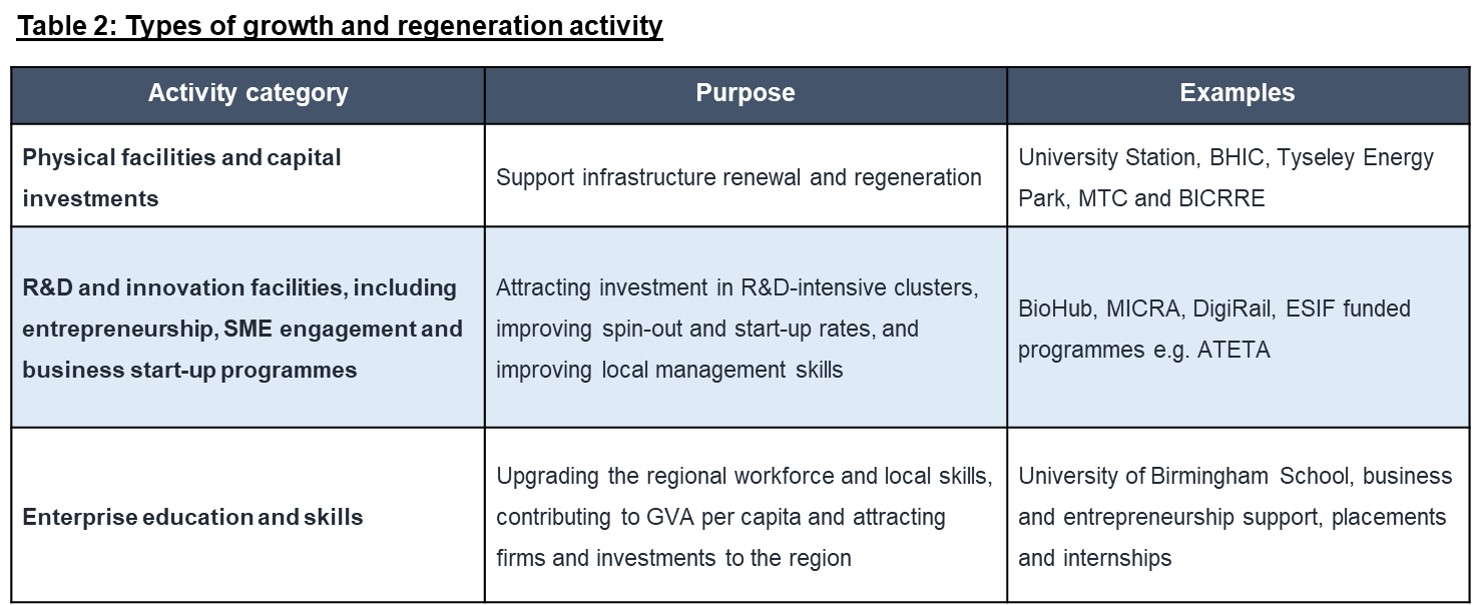
Aspect 3: Results
Each initiative has its own approach to evaluation, drawing on quantitative and/or qualitative methods to communicate outputs and outcomes to audiences and stakeholders. However, we recognise the importance of aggregating these outcomes to demonstrate institutional impact and identify the issues that will shape our ongoing engagement strategy.
Initiative Outputs and Outcomes
We are proud of the significant outputs generated by our local growth and regeneration activity. These include:
200 industry partners engaged through BHP, attracting more than £20 million per year;
23 new research and innovation facilities and over 1000 PhDs established by the nine Midlands Innovation partners of the Energy Research Accelerator;
Over 1280 businesses have been supported through European Structural and Investment Funded (ESIF) SME projects since 2017 (increasing to 1730 businesses by June 2023). This support has seen an increase in employment by over 50 new jobs, and 320 products and services developed, leading to 125 commercialisations/products to market;
485 businesses have been supported through bespoke student-centred entrepreneurship programmes in the past three years.
However, we also seek to measure the outcomes of our interventions on objective measures of growth and development.
Our health research programmes have accelerated significant patient benefit, including >£200m of experimental, novel therapies from industry and fast-tracked trials for regional cancer patients. Our energy expertise continues to attract investment into the region, with a proposal for a further £250m investment in ERA supported by £1.4bn from industry. Internationally, we have produced positive health and economic outcomes in China, India and Brazil.
Our work in advanced manufacturing delivers jobs and apprenticeships, wealth creation, and the next generation of scientists and engineers. UoB continues to add to the region's skills, training the next generation of public sector workers and student entrepreneurs. 48% of UoB graduates make the West Midlands their home when they join the workforce, 72.5% of our cultural interns have found employment in the cultural sector, and we improve the educational outcomes of local young people through the UoB School and regional access programmes.
Programmes like Minerva Birmingham Pitch Up have helped to bring in excess of £3m of investment to the region's small businesses, while the three-year Birmingham Knowledge Economy Business Incubation Programme, in collaboration with Innovation Birmingham, supported 226 of the region's high-tech SMEs, contributing to the creation or sustainment of 129 jobs.
The WM Growth Company (WMGC) reports a significant increase in regional investment opportunities, many resulting from meetings and events held in DIT's UK House in The Exchange (above).
UoB has also made significant investments to improve regional infrastructures critical for maximising regional growth. For example, a £10m investment to upgrade the University Station helped ensure over £45m from a consortium of backers (Network Rail, West Midlands Trains, the Department for Transport, the Greater Birmingham and Solihull LEP, Canal and River Trust, SLC-AECOM, CrossCountry Trains and Midlands Engine). This will deliver a better public transport offer for staff and students, encourage greater use of public transport and enable enhanced access to the public, cyclists and particularly disabled people. Providing a connection between central Birmingham and the QE hospital and University campus, the station also enables more accessible links to BHIC and a dedicated NHS public health facility.
Institutional Results
The outputs and outcomes of department-level initiatives are displayed through annual reports and case studies. These findings lay the foundation for a sustainable cycle of joint strategy development, delivery and reporting with key stakeholders, as recognised by regional leaders (see figure 4). We also recognise outstanding business and policy engagement by individuals or teams through the Founder’s Awards, communicating the benefits of successful knowledge exchange across the institution.
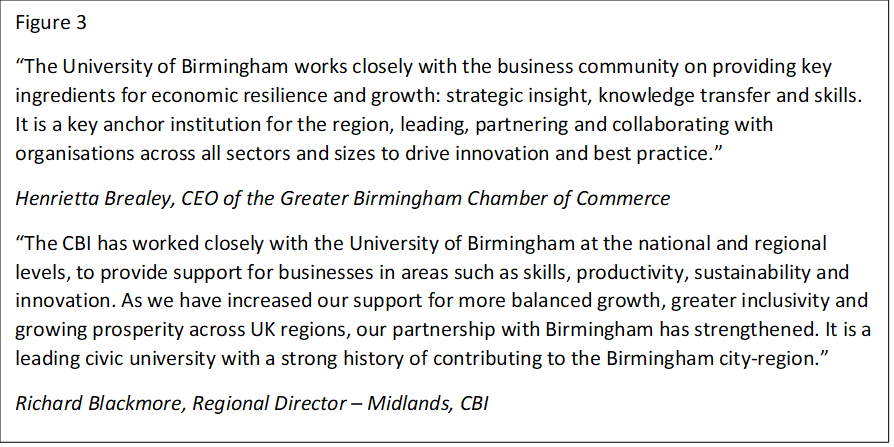
UoB was amongst the first HEIs to commission external consultants to evaluate our institutional economic impact. In 2016, London Economics concluded that our regional economic impact was £3.5 billion. Our next report, currently being commissioned, will be a more rounded assessment to include the social value of our activities.
Other external measures of our regeneration impact come from HESA data. UoB has one of the highest reported levels of regeneration funding income across all HEIs for the past three reporting years and demonstrates a continued strong performance with its upward trajectory: £35.8m (2019/20), £34.7m (2020/21) and £39.9m (2021/22).
Public & Community Engagement
Summary of approach
We pride ourselves on being a world-class research university, consistently and demonstrably pursuing purposeful engagement with communities locally and globally; opening national and international conversations.
Our 2022 NCCPE Gold Watermark award is testament to this commitment, as are our four ACE-accredited museums/archives, including Lapworth Museum of Geology and Barber Institute of Fine Arts. Our £40m investment in The Exchange created a focal point for knowledge exchange, community, and public engagement in the heart of Birmingham, the UK’s youngest and ethnically diverse city. As official partner of the Commonwealth Games we developed a diverse engagement programme for 17,000 daily visitors to campus, worked with communities as part of the cultural festival, and took activities overseas through the Queen’s Baton Relay.
Aspect 1: Strategy
The University of Birmingham (UoB) is a deeply engaged institution. The vision articulated in our Strategic Framework - Birmingham 2030 is to be the UK’s exemplary civic university, firmly committed to engagement with the highly diverse communities, people, and economy of the city of Birmingham and the West Midlands. One of the six pillars of our Strategic Framework is our commitment to Engagement and Impact.
We have an Institutional Strategy for Public Engagement with Research and have committed to refreshing our vision for Public and Cultural Engagement (PACE) in 2023, and putting public audiences and community partners at the heart of our decision making and engagement activity. Spearheaded by the Director of PACE and the Deputy Pro-Vice Chancellor for Research Impact it will include consultation with community and cultural partners and will culminate in the creation of a refreshed PACE Strategy which supports the new institutional Strategic Framework – Birmingham 2030, the Civic University Agreement (CUA) and aligns with the University’s new Impact Strategy.
Institutional responsibility for Public and Community Engagement (P&CE) sits with Pro-Vice Chancellor (PVC) Research and Knowledge Exchange and the Pro-Vice-Chancellor and Head of College of Social Sciences who is the Executive Board lead for Engagement. The PVC Research Chairs the University’s bi-monthly University Research Committee (URC) and reporting into URC is the bi-monthly University Engagement and Impact Committee (UEIC), which focuses on Knowledge Exchange including P&CE, research impact, policy impact and innovation/commercialisation.
Within the University’s five academic colleges (Arts and Law, Social Sciences, Life and Environmental Sciences, Engineering and Physical Sciences, Medical and Dental Sciences), leadership and governance for engagement is provided by senior academic College Engagement and Impact Leads working alongside the College Directors of Research.
Institutional professional service leadership for P&CE sits with a dedicated Director and a central PACE team. Birmingham remains one of a small number of institutions with a dedicated publicly-facing Professor of Public Engagement with Science post, Professor Alice Roberts.
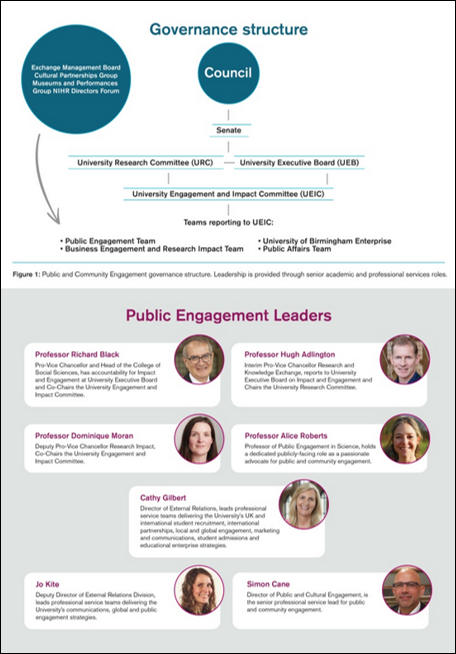
UoB has been a signatory of the NCCPE Manifesto for Public Engagement since 2012 and in 2022 undertook the Engage Watermark assessment, through which we were awarded Gold Watermark status recognising our significant strategic commitment to P&CE. We are only one of handful of universities nationally to have achieved Gold. In response to our Watermark Assessment we have developed an Institutional 3-year Action Plan which articulates how we will deliver our vision whilst aligning with our institutional priorities surrounding EDI and Sustainability.
We are committed to creating and maintaining an inclusive learning and working environment where discrimination is not tolerated, where all members of the University can flourish and reach their full potential. This includes the ways that we engage with our external stakeholders including public audiences. Our Institutes, Schools and Student Union have community-led committees working to foster culture change in EDI. We were one of the first Universities to be a signatory of the BBC 50:50 equality project and we have invested institution funds in training to support our female scholars as they share their research with public audiences. At The Exchange we have prioritised projects coproduced with communities in Birmingham which will enable us to diversify our prospective audiences, remove barriers to their participation and champion inclusion for staff and students delivering activity.
Through our Patient & Public Involvement & Engagement (PPIE), significantly pump-primed through NIHR investment, we have built a team of professional specialists and dedicated academic posts. These individuals work collaboratively to develop shared approaches to training and support the development of long-term partnerships with underrepresented groups. Shared strategy is developed through our NIHR Directors Forum, which has co-developed consistent, inclusive approaches across more than £100million of recent investment in major regional programmes. Our national and international leadership is represented by initiatives such as the UK’s only Centre for Patient Reported Outcomes Research, as well as our role leading PPIE in national networks such as NIHR’s Research Design Service.
Aspect 2: Support
We offer support to academics, students and staff at all career stages and levels of experience to ensure that P&CE can be delivered effectively. Support is offered through central functions and across Academic Colleges. Logistical and marcomms support is provided via embedded Departmental staff to support grass roots engagement. An online ‘researcher hub’ provides a ‘one stop shop’ for academics at all career levels to identify and access the breadth of in-person, online and 1-1 training available.
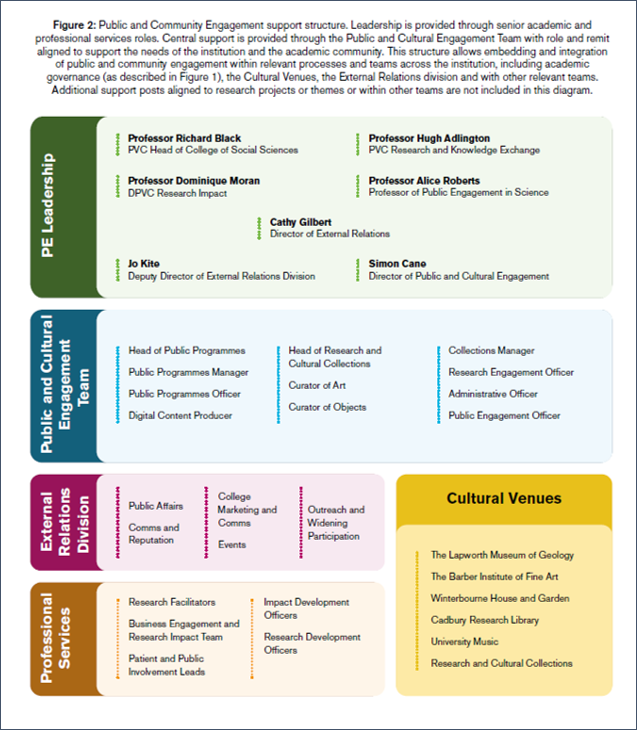
The PACE team plans and delivers an annual programme of core and more specialised training, the latter informed by emerging needs in the academic community. The programme includes an annual PE Conference and sessions led by external freelance trainers. In 2022 the University allocated an additional £98K which will be invested in training programmes including additional bespoke support for over 650 PGRs, ECRs and research leaders over the next 18 months.
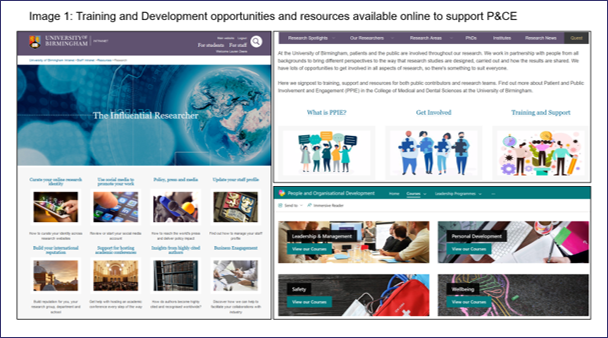
Reward and recognition are important ways in which we demonstrate to staff that we genuinely value P&CE and a distinctive feature of Birmingham’s approach to engagement is that it is institutional rather than siloed. All staff from across all our disciplines and academic units are enabled to embrace engagement and it is now essential for promotion. In 2022, the University introduced a new Birmingham Academic Career Framework (BACF) which identified Enterprise, Engagement and Impact as core career pathway for academics to follow ensuring P&CE activity is recognised and rewarded.
We offer several institutional awards for excellence in P&CE designed to reward and share excellent practice with the University community. These includes The Founders Awards, The Impact Awards, The Light of Understanding Award, and The Alice Roberts’ Post Graduate Researcher Award for Excellence in Public Engagement.
Funding is provided to enable researchers to deliver P&CE activity including:
six Impact Accelerator Accounts (IAAs) from research councils (BBSRC, EPSRC, ESRC, MRC, STFC and AHRC) distributed via internal competition.
Quality Related Research funding which provides annual funding for P&CE projects. New funds launched in 2022 committed support to 13 new initiatives including community researcher programmes and projects working with voluntary sector organisations in the city.
the Public Engagement Fund which supports new ways to engage public audiences and provides opportunities to increase the knowledge, skills and confidence of researchers.
Central staff budgets to support P&CE include the central PACE team and the Professor of Public Engagement with Science. Also sitting centrally are non-pay budgets for P&CE in 2022-23 this was £404K predominately focussed on delivering programmes at The Exchange.
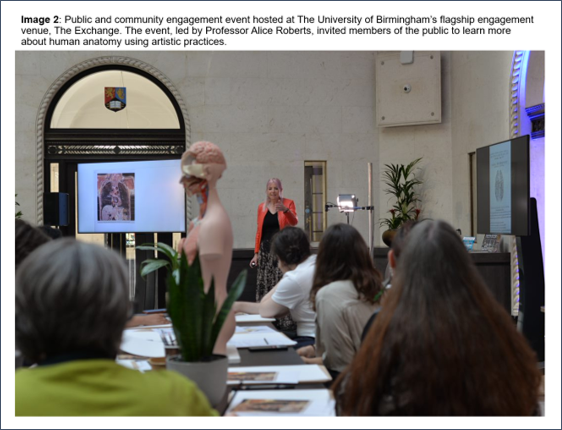
Aspect 3: Activity
Our approach mirrors our strategy and support, incorporating both central and departmental/researcher-led activity, with central provision focussed on increasing awareness, capability, and collaboration amongst internal and external audiences. UoB delivers a huge volume of events reaching audiences >0.8 million in 2021/2022. Community access is a priority and we reach 4x as many attendees through free versus charged activities.
Increasingly we focus on identifying which audiences and demographics engage and the outcomes. In 2021 UoB launched the £40 million city centre investment, The Exchange, with dedicated spaces for P&CE. An extensive audience development review of our inaugural public programme provided a series of recommendations. We are currently defining a set of priority audiences through consultation with our community and cultural partners. These audiences, which will reflect the diversity of our city, will be embedded into the activity of the PACE team, our cultural venues, and by individual researchers.
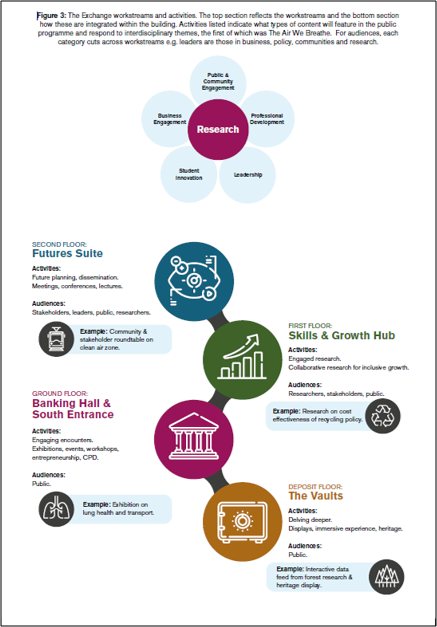
Across our five Colleges we have strong interest in city, regional and national issues and have hundreds of individuals who are building relationships with relevant public, third sector and private organisations, affording them access to our research. This work is being spearheaded by colleagues in the The Centre for Global Women’s Health, the School of English, Drama and Creative Studies, the Institute for Mental Health, the Applied Research Collaboration (ARC) West Midlands, the Centre for Systems Modelling and Quantitative Biomedicine and the Birmingham Energy Institute.
Examples of programmes and their outcomes from the last 3 years:
Centrally Delivered
Commonwealth Games Cultural Programme including contributions from our community partners. Events included Waswasa, Choc Fest, Osun’s Story, The Commonwealth Games: A Roundtable Discussion and Creativity and Curiosity.
CREDiBLE
Departmental
Researcher-led
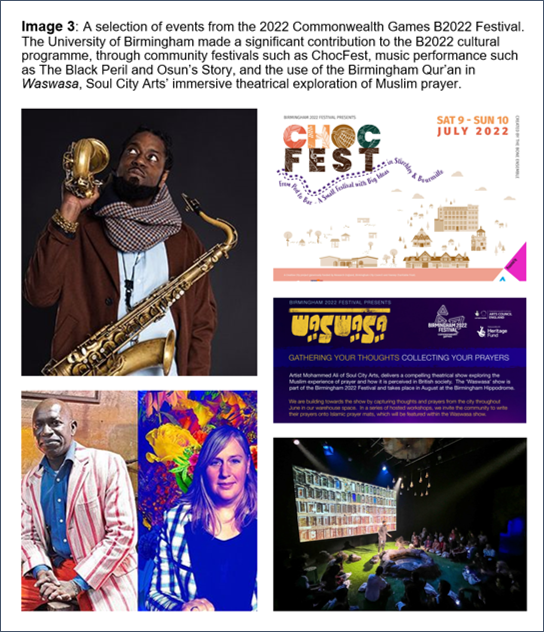
While activity is dispersed across the organisation, the PACE Team draw together learning to guide good practice, showcasing standalone projects at the PE conference, inviting colleagues to share learnings and providing training and toolkits for best practice in audience development, delivery and evaluation.
The Outreach team works with over 250 schools and thousands of students from across the West Midlands region every year. RAISE events provide fun experiences such as big quizzes and Christmas lectures for secondary school students. We deliver Masterclasses for GCSE and A-level students in a range of subjects and a number of intensive outreach programmes including Forward Thinking for students in Years 8-11, a Year 10 Summer School and Pathways to Birmingham programmes for post-16 students.
Across life and social sciences, professional PPIE staff and academic leads collaborate with NHS, voluntary, community and social enterprise partners to develop coherent and strategic approaches to patient/citizen involvement, with hundreds of active public contributors involved in research advisory groups. We credit public contributors as co-authors on our research publications; change our approaches and strategy based on their input through formal roles across a range of senior management groups for major infrastructure programmes.
UoB’s cultural venues – The Barber Institute of Fine Arts, The Lapworth Museum of Geology, Winterbourne House and Gardens, Research and Cultural Collections, The Exchange, Cadbury Research Library and University Music - provide a consistent and targeted P&CE offer. Average annual audience figures for these venues is c620,000 and examples of P&CE projects delivered over the last 3 years include:
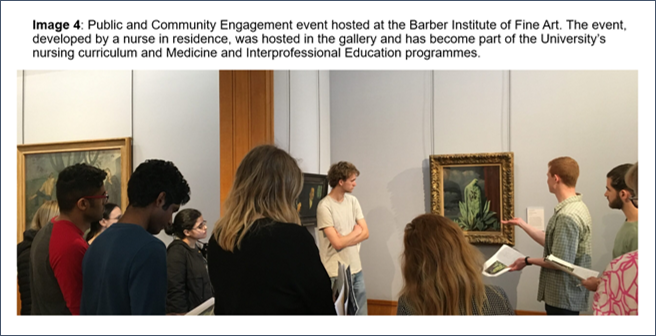
Aspect 4: Enhancing practice
Critical to excellence in public engagement is an effective approach to evaluation and evidencing. At UoB this applies both to engagement activities undertaken by our academic staff, activities undertaken by the PACE team and those taking place at our cultural venues.
At University level, we review performance against various KPIs including: the number of REF Impact Cases featuring P&CE; the HEBCIS data on P&CE participation (physical attendance and online engagement) and external grant income awarded for P&CE.
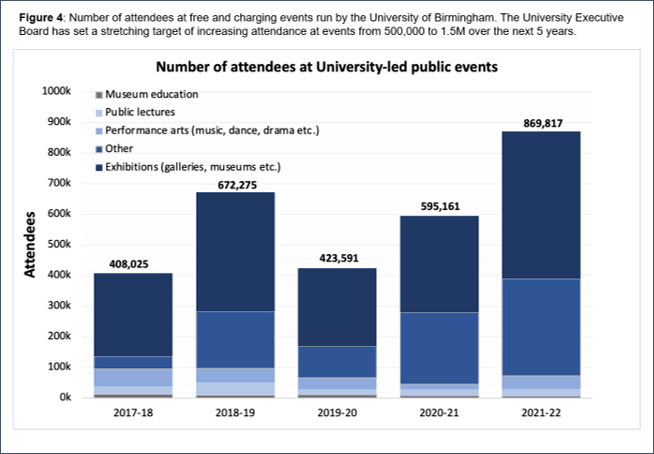
We have developed resources to support those delivering P&CE to evaluate their activity including in person and online training, a guide to evaluating public engagement and template forms and practical resources.
Sixteen of our 2021 REF Impact Case Studies were overtly based on P&CE, demonstrating significant change to public debate and understanding, and many more have a P&CE element. Impact is evidenced by assessment of the impact on how people think and behave because of the engagement as well as metrics such as audience figures. Case studies also inform institutional evaluation practices.
Over the last two years the PACE team has delivered one of the Wellcome Trust’s largest project-based public engagement grants – the CREDiBLE project – which worked with four Birmingham based community partners to test different methods of community consultation and coproduction. Evaluation of the project has informed the development of a toolkit which will inform the work of the PACE team, academic colleagues and be shared with other HEIs.
Internally funded P&CE projects are evaluated annually to assess outcomes as well as monitoring who applies for funding. We also review and embed best practice for evaluation at institution-wide events including our annual PE conference and Research Conference which include workshops on P&CE evaluation.
As an Arts Council England National Portfolio Organisation, The Lapworth Museum of Geology follows a rigorous evaluation framework for its engagement activity contributing data and insight into national reports which allow a better understanding of trends in audience behaviours, motivations, experiences and demographics.
Our PPIE projects use GRIPP2, the first international guidance for reporting of patient and public involvement in health and social care research, to evaluate the outcomes of their projects, aligning approach and reporting across a broad portfolio of projects.
A key aim for the next two years will be to develop a P&CE evaluation framework for the University which will be used to evaluate the activity of the PACE team and used by recipients of internal funding to evaluate their projects to improve their practice and evidence the impact of their research.
Aspect 5: Building on success
In 2018 we were granted a Silver Engage Watermark award from the NCCPE and implemented an Institutional Strategy for Public Engagement with Research and 3-year action plan to provide a structure for continuous improvement. The delivery of the action plan was spearheaded by the PACE team and monitored by our internal governance system as described in Aspect 1 and outlined in Figure 1, including annual reports on P&CE to University Research Committee.
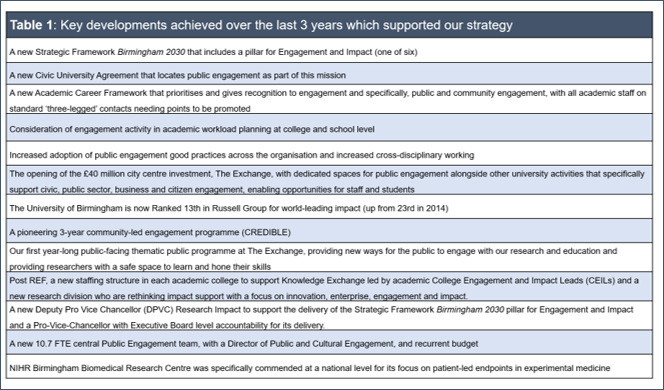
To enable our strategy to be informed and shaped by our diverse community and cultural partners we have introduced several forums for dialogue and discussion including The Exchange Programme Board and Culture Forward. We have also invested in staff within the central PACE team who act as caretakers of relationships with key community partners in the City.
P&CE at University’s flagship venue, The Exchange, was shaped by The Exchange Programme Board, comprising internal staff and external stakeholders drawn from across the city to support collaboration towards co-creation and co-production. This meeting reported into The Exchange Management Board, chaired by Provost and Vice-Principal.
The College of Arts and Law is delivering a new initiative on behalf of the University, Culture Forward, which enhances the University’s connections with the cultural life of the City of Birmingham and wider region. This project brings us into closer and more creative partnerships to leverage culture for civic regeneration, building on the momentum of Birmingham 2022. Founding partners include Birmingham City Council, Culture Central, Birmingham Law Society, Birmingham Museums, Birmingham Royal Ballet, the City of Birmingham Symphony Orchestra, Ex Cathedra, Soul City Arts, Birmingham Repertory Theatre and Writing West Midlands.
In 2021 we reapplied to the NCCPE Watermark and were successful in being awarded Gold. The process involved an assessment of the understanding and awareness of P&CE, our strategic intent, how effectively we’ve focussed on enhancing our support and how we’ve benchmarked our activity against other institutions. The assessment included both staff, student and external partner questionnaires and the creation of a synthesis report highlighting strengths and weaknesses. This report then informed the development of a new 3-year action plan which will steer UoB’s P&CE activity and allow us to push our aspirations further to become one of the most engaged universities in the UK.
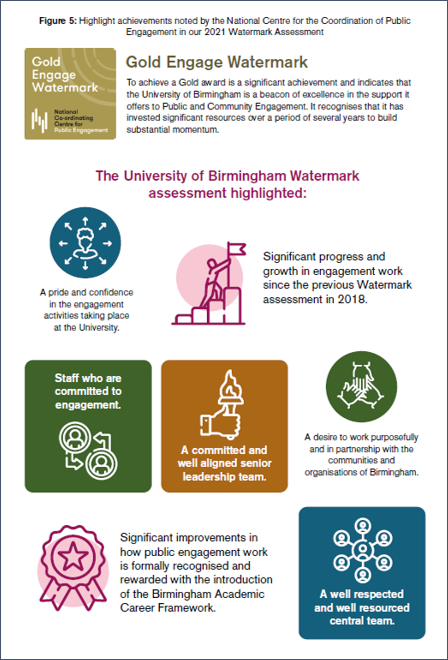
Note You are currently viewing the latest version of this narrative statement. View the previous version as published in previous iterations of the KEF (KEF1 and KEF2)